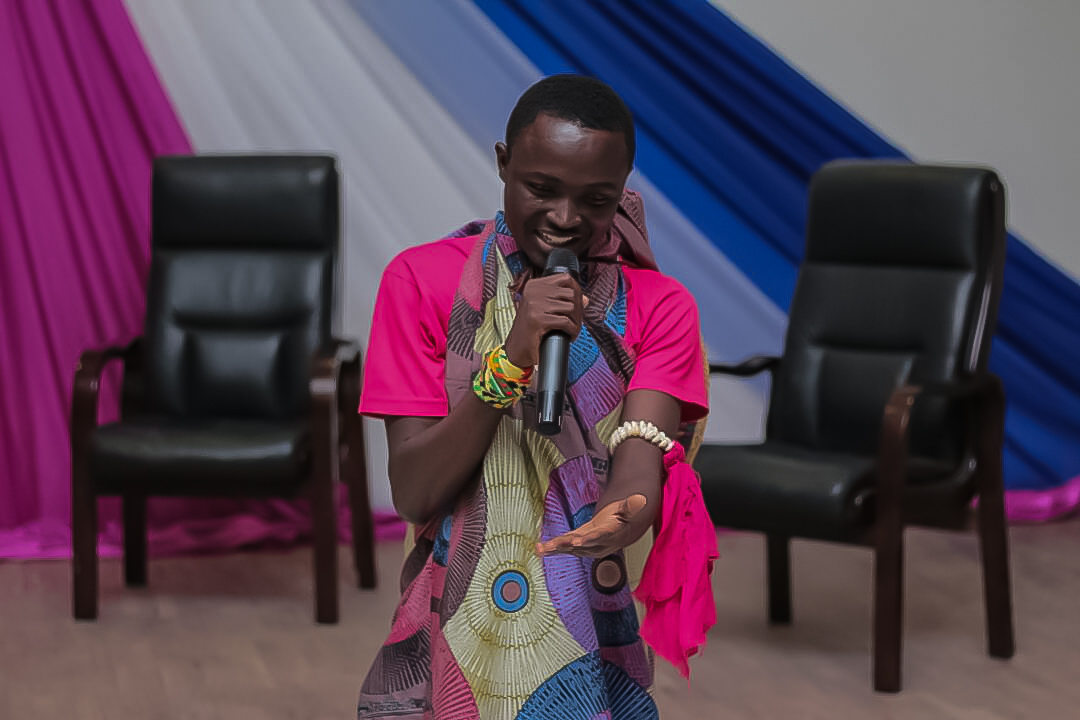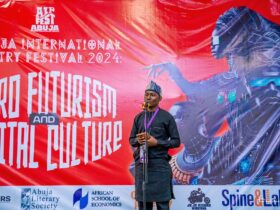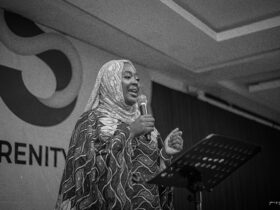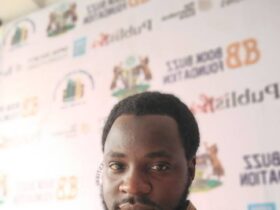
Konya Shamsrumi: What is the process of writing a poem like for you? Is it a lot of hard work or easy?
Abeiku Arhin Tsiwah: I don’t know how the process of creating any artistic work looks like for other creatives. Personally, the process of writing a poem can be both haunting and intuitive. It could start off as an idea and slowly expire, and begin as an idea again and eventually ripple into something unmistakably unexpected. What I know for sure is that the words which fruition in the process, most often than not, bear a certain fragment of me hidden in surreal nightmares.
Konya Shamsrumi: Please describe your sense of identity in this or any possible world in imagery or metaphor?
Abeiku Arhin Tsiwah: Rebellious. Take this cake. Take this spectacle. View my works as a charged river with everything that is moving through orchards. Maybe, surreal, maybe, ethereal, maybe, folkloric. I am just like the proverbial Ananse.
Konya Shamsrumi: If any of your poems could literarily save a person’s life, which poem would it be and can you describe the person whose life you think it would have saved?
Abeiku Arhin Tsiwah: That is a very tough one. Well, I don’t think there is this one particular poem of mine that can assume such a ‘divine’ state. The poems are innumerable to say the least. But I would say that in 2019, one particular poem that hits me the most in my adrenaline whenever I revisit it is “In My Mother’s House”. I think my mother (Esi Anansema) would be the one who would be most emotively stricken about it. It revolves around everything I have learnt about her and the extended family/ethnicity that she begat me from. Below is an excerpt of it.
“In My Mother’s House”
In my mother's house, a painting on the wall is God's forgotten commandments. There is no miracle in filtering yourself on Snapchat or paraphrasing your clan's totem in a Whatsapp status.
To love your body, you've to learn to embrace the wind when you go nude before your partner's eyes. My mother had told me, that, a woman's body is a dissolved temple suffering dislocation on God's tongue.
On every sundown, a ripe child tries traveling beyond the stretch of our arms. We pour onto it body a calabash full of ash—if it's a male. We christen it body with concoction—if it's a female. Then we gather their abstracted olfactory nerves mid-air & summon the spirits in the compound house musing a ritual: You, who shall bring us ornaments—sojourn well. You, who shall bring us opulence—may eggs visit your womb.
Konya Shamsrumi: What does Africa mean to you, as potential or reality?
Abeiku Arhin Tsiwah: Africa as potential or reality? That is a highly colonial language. But why would anyone in the first frame think of Africa as a potential or reality bait? Would anyone be kind to assume Europe or, say, North America as being a potential or reality catchphrase? I think that by and large, Africa is what Africa is. It is what it is. Narrative discretions won’t wash it off this geo-spatial plate. Just as any other realm or continental base point has remained insolvent of its problems, Africa has a knowledge of its own as concealed in its vast body-of-language; culture, etcetera.

Konya Shamsrumi: Could you share with us one poem you’ve been most impressed or fascinated by? Tell us why and share favorite lines from it.
Abeiku Arhin Tsiwah: ‘Time Machine‘ written by Henneh Kyereh Kwaku which is one of the poems from his upcoming chapbook “Revolution of The Scavengers” selected by APBF-chapbook set and edited by Kwame Dawes & Chris Abani.
The excerpt reads:
The year is 1982. When the year began, there were judges & there were three judges. The year ends & there are no three judges. But there are judges. Gone with the wind. Three judges gone. Not gone—killed but death is responsible for their death. Everyone knows someone pushed the hands of death to take their lives. It wasn’t their time to go. Someone showed them the way to go too early. Justices—Poku Sarkodie, Cecelia Koranteng-Addow and Kwadwo Adjei Agyepong—all gone. News headline: Witness accuses ex-Ghanaian president of killing judges.
Without mincing words, this is the most highly esoteric poem I have witnessed any modern-day Ghanaian Poet write that intricately provokes a “masked truth” in the Ghanaian historical landmark. Anyone who has read and is aware of the landlocks in the political history of Ghana and is conscious of the plot around the gruesome murder of the three Ghanaian judges would be startled with how this unwholesome truth was captured by the poet.
Bio: Abeiku Arhin Tsiwah is a Ghanaian Smartphone Enthusiast //& Content Critic. He’s the Senior Poetry Editor at Lunaris Review (a Journal of Arts & the Literary, Nigeria) & the Creative Director at The Village Thinkers (a Creative Writing & Arts Society, Ghana). The 2018 Shortlisted Poet for both African Writers Awards /&/ West Africa Citizens Awards has had his works published in Afridiaspora, Peeking Cat Poetry, EXPOUND, Whispers, Novel Masters, African Writer, Agbówó, Tuck Magazine, Africa Redemption Magazine, The Liberian Literary Magazine & elsewhere.













Leave a Reply